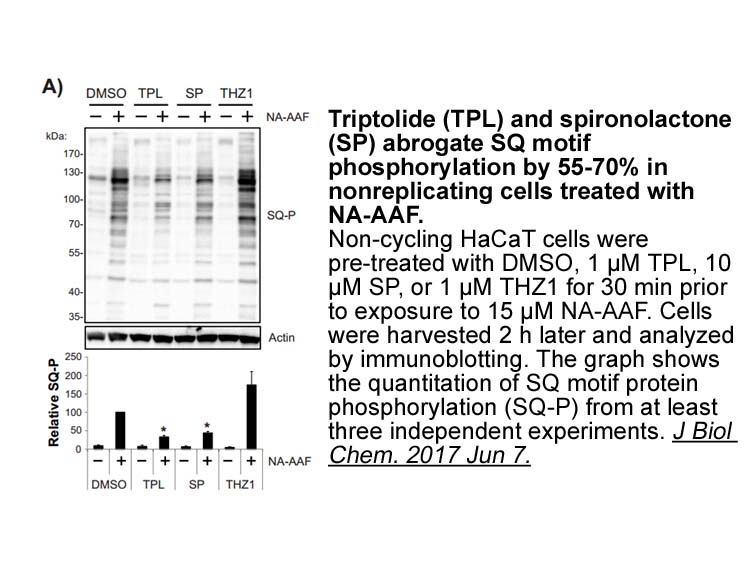Archives
br Discussion In our current study we demonstrated
Discussion
In our current study, we demonstrated that both the metastatic and recurrent ovarian cancer tissues expressed lower levels of p62 when compared with the patient-matched primary tumor samples. High AZD2858 levels of p62 were associated with long progression-free survival of patients with ovarian cancer, which is in concordance with the observation that a low level of p62 is regarded as a biomarker of autophagic activity. Our investigations highlight an association between an increased level of autophagic activity and an unfavorable prognosis in ovarian cancer. Similar correlations of high LC3/Beclin-1 expression and poor clinical features were also found in ovarian cancer and other cancer types such as glioma and triple-negative breast cancer [15,29,30]. High expression of LC3A proteins was associated with lower response to platinum therapy, leading to worse PFS and OS in ovarian clear cell carcinoma [30]. Moreover, overexpression of LC3 was associated with melanoma metastasis and vasculogenic mimicry, and strongly linked with poor clinical prognosis of human melanoma [31]. Another study comprised of 127 consecutive colorectal cancer patients showed that decreased cytoplasmic p62 expression was significantly associated with an unfavorable tumor-specific overall survival [32]. Although there is evidence implicating the prognostic function of autophagic protein expression, the role of p62 in ovarian cancer has not been studied extensively. Our study is the first to provide evidence that the loss of autophagy substrate p62 protein can predict poor prognosis in ovarian carcinoma patients.
We further examined the related expression of p62 and other autophagic proteins in two pairs of drug sensitive and resistant tumor cell lines. Both of these MDR cell lines had higher levels of autophagic activity when compared with their respective sensitive cell lines. Several recent studies reported that autophagy induction contributed to cisplatin resistance in ovarian cancer [33,34]. In our study, we showed that paclitaxel treatment activates an autophagic response in MDR ovarian cancer cells. This data indicates that the induction of autophagy may play a role in the development of drug resistance. Currently, more than 30 phase I/II clinical trials are investigating the effects of autophagy inhibitors in combination with cytotoxic chemotherapies in different types of tumors [10,35]. Targeting autophagy has been shown to resensitize resistant cancer cells thus enhance cytotoxicity of chemotherapeutic drugs [11,36]. In our study, combination treatment has a strong synergistic effect on anti-proliferation and sensitization of MDR ovarian cancer cells to paclitaxel. A growing body of evidence highlights the direct involvement of autophagy in cell migration and cancer metastasis [37]. We further evaluated the role of autophagy in the modulation of cell mobility. The results demonstrated that inhibition of autophagy suppressed the migratory capabilities of MDR cells, suggesting that autophagy may be a contributor to ovarian cancer metastasis, which is the main obstacle in the clinical treatment.
After transfecting the p62 plasmid into MDR ovarian cancer cells, we discovered that the accumulation of p62 could cause autophagy pharmacological inhibition and thus enhance the cytotoxic effect of the chemotherapeutic agent paclitaxel. Recent studies demonstrated the anti -tumor and -metastatic effects of p62-encoding DNA vaccine in various types of commonly used transplantable tumor models of mice and rats [[38], [39], [40]]. p62 vaccine suppressed both primary tumor and metastases formation, and was effective for both prevention and treatment [40]. These results demonstrate that the targeting of p62 is promising for therapy.
T he following are the supplementary data related to this article.
he following are the supplementary data related to this article.
Conflict of interest statement
Acknowledgments
This work was supported, in part, by a Joint Research Fund devoted to clinical pharmacy and precision medicine (Z.D and Q.K). Support has also been provided by the National Natural Science Foundation of China (No.:81402266 and 81372875), the Gattegno and Wechsler funds (206632). Dr. Duan is supported, in part, a Grant from National Cancer Institute (NCI)/National Institutes of Health (NIH), UO1, CA151452-01. Dr. Wang is supported by scholarship from the China Scholarship Council (201607040013).